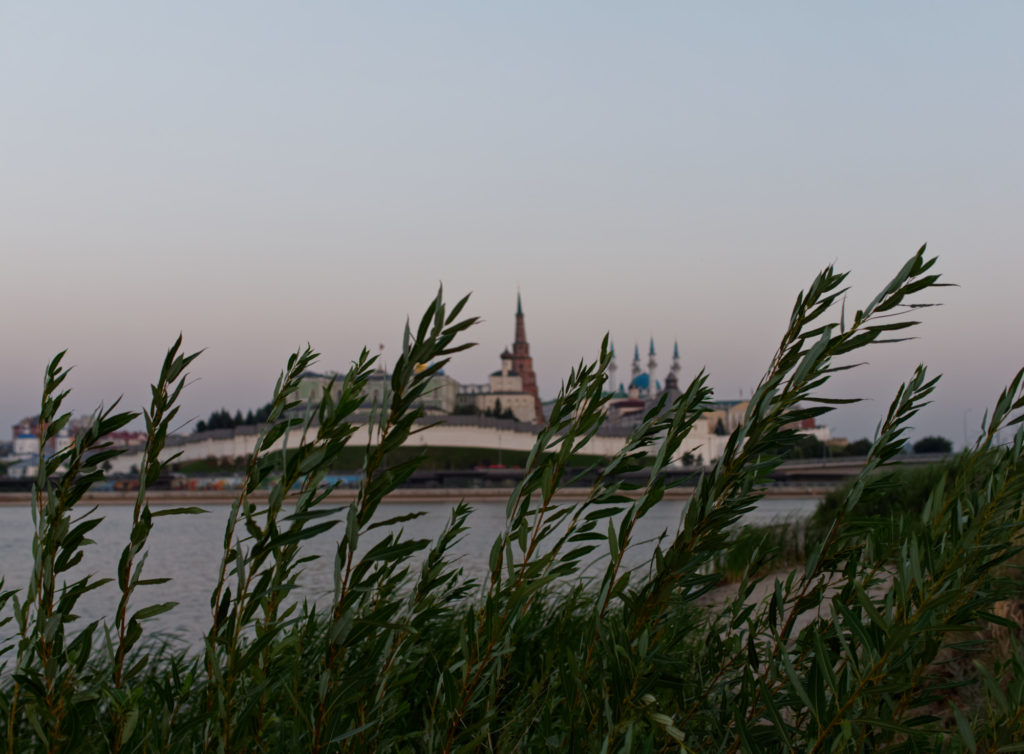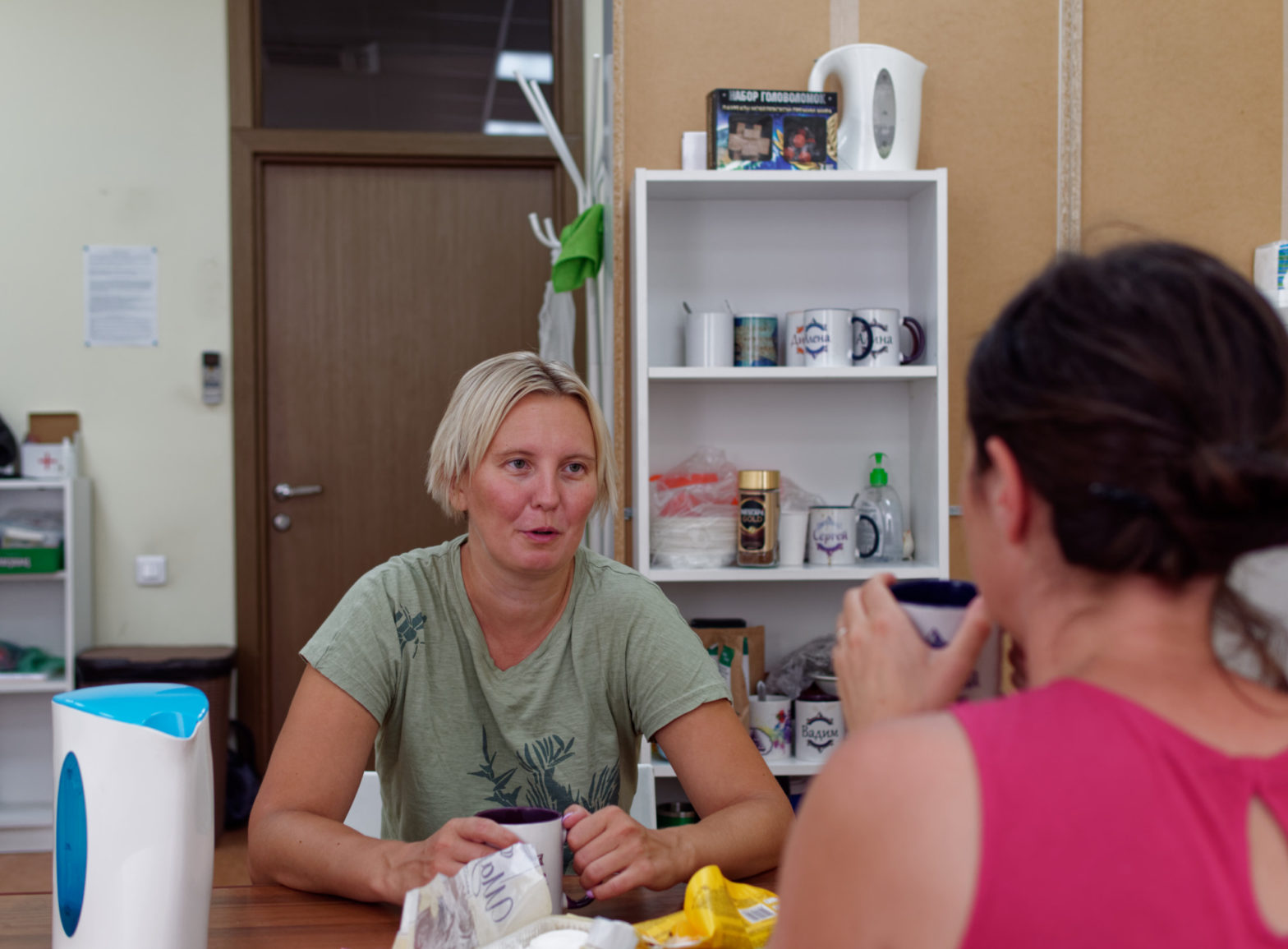Not a formal organization but what’s in the heads!
Lyudmila Lazareva opens the doors of an office building in the center of Kazan for us. We follow her into one of its wings — the Mathematical Center she runs lends several rooms along a corridor. « Our Center has opened seven years ago, » says Lyudmila. « Although we’ve existed as a community of mathematicians since much earlier. What matters is not a formal organization but what is in the heads! »
All classrooms in the center look the same, with a strikingly minimalist setting: two dozens of desks and chairs in front of a big blackboard, a timetable pinned to the wall, and a board game lays on a windowsill — that’s all. « We do not do much decoration here, we do mathematics!, » laughs Lyudmila.
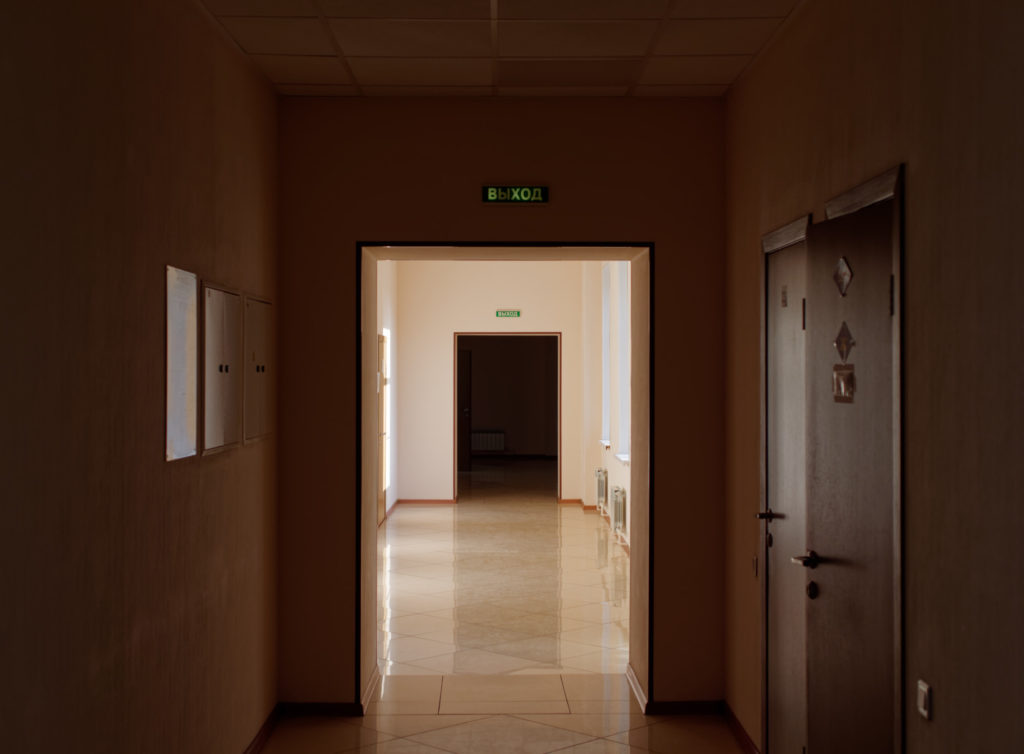
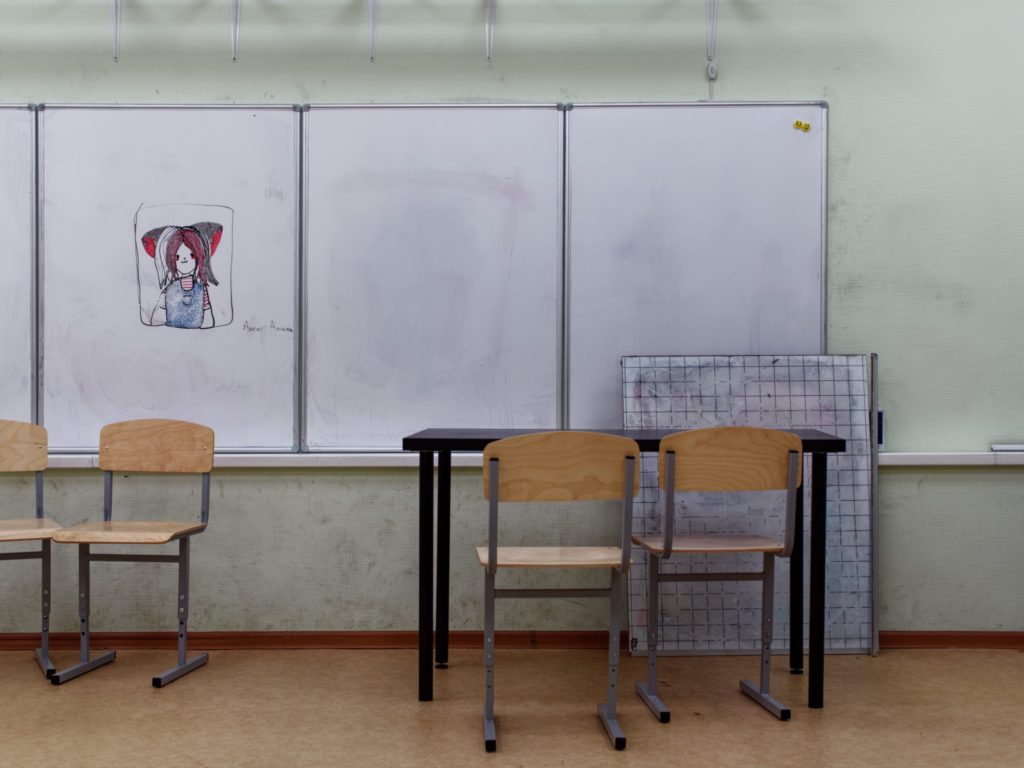
It is hard to imagine the classrooms full of children in the middle of August, when we are the only people in the center, with boiling water in the kettle breaking the perfect silence. « The center is emptier than it usually is, » Lyudmila explains. « Several classrooms lack chairs and desks — everything has been transported to our summer camps. And many of our students are there too! », she says. Even the teapot from the common room has been taken to the camp. The only kettle left in the center is in the administrator’s room, luckily, Lyudmila has a key to it! We drink tea from the named cups of the teachers of the center and try to solve some problems that Lyudmila gives to her young students.
If one turns one five rouble coin around the other which is laying on the table, how many turns will the first coin do around itself?… We both first think that only one turn but the experiment shows that it would be two turns! The mathematical question is to find a convincing explanation why it happens like this! We both stare at the tea cups that we hold in our hands, trying to find an answer. Lyudmila smiles proudly and says that this is one of the problems that she has found in a book by Jacob Perelman, “Lively mathematics“, which made her love mathematics.
Members of the center teach olympiad mathematics for students from 7 to 17 years old in the course of the year. In summer, they organize not one, but two parallel summer camps, for a total of six hundred children. « It started much smaller but gradually we just stopped fitting in one place!, » Lyudmila laughs. We decide to go to one of the two summer camps the next day.
A mathematical camp in the forest
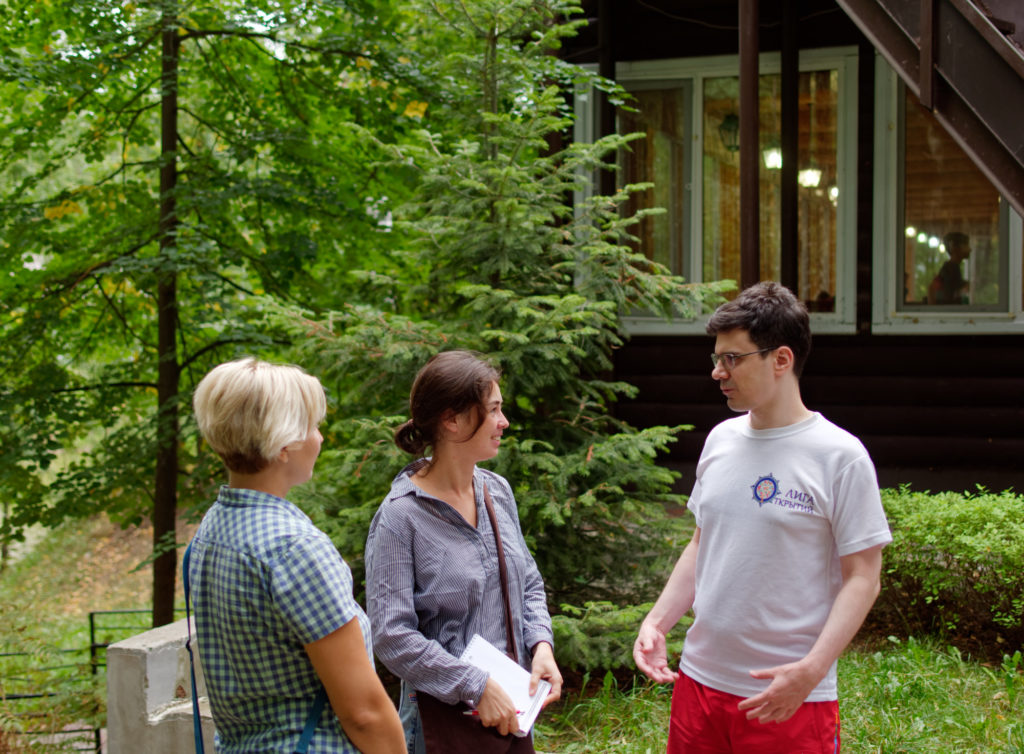
Next day, we arrive to the Regina Camp, situated fifteen kilometres south of Kazan. It has been raining all morning. The smell of wet pines surrounds several stone buildings, wooden cabins and playgrounds connected by tiled paths of the camp. Such camps are quite usual in modern Russia — most of them have been constructed in Soviet times and managed by trade unions and Komsomol organizations, in order to welcome pioneers in vacation times or, sometimes, all over the year.
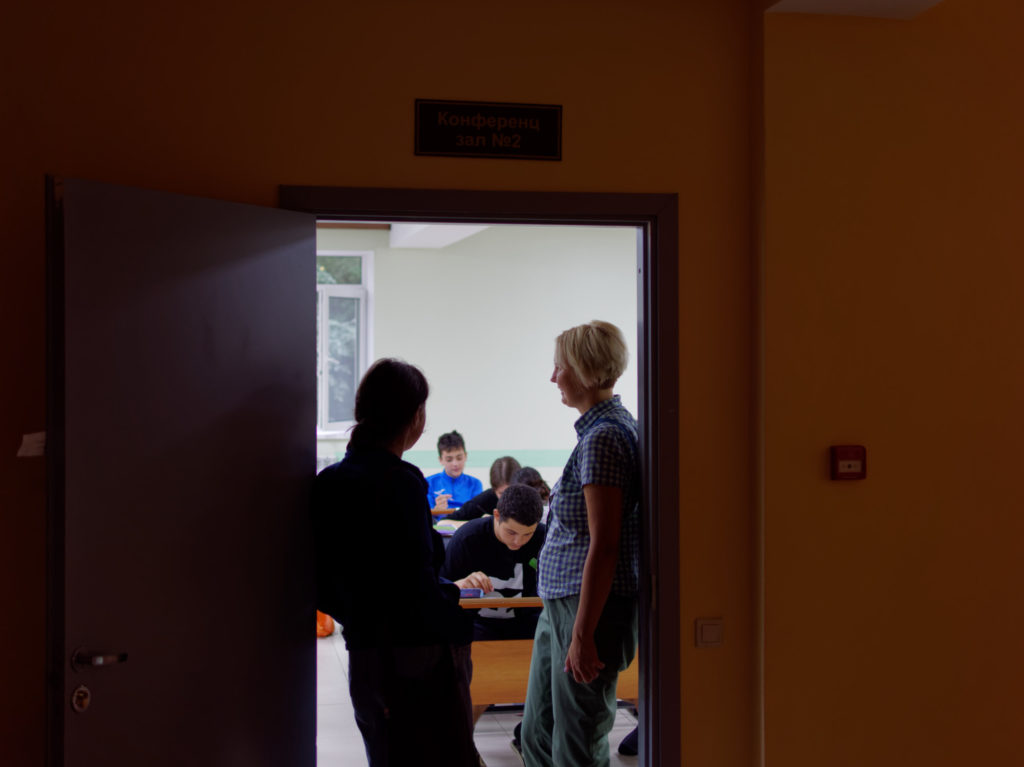
We arrive around noon. There are a few children outside a first building — and it is not at all the weather which is responsible but mathematics! « Most of students are at class », explains Lyudmila. The several buildings we visit are all full of students working on mathematical problems. Several hundreds of children are staying in this camp, doing non-stop mathematics for a couple of weeks. Most of them are already « in the system » — they have visited this camp last year or went to mathematical clubs in Kazan or other cities previously. But there are also some children for which this is a first time.
Many parents are worried to leave their children alone for two weeks. They call us to know how the school is going on, and some come to visit after one week has passed to find their children very happy and leave reassured. I even had one parent crying when he was leaving his seven year old son with us on the first day of the camp. It was a very touching moment for him, and for myself as well — he was one of my first students seventeen years ago, when I was myself studying mathematics at Kazan University and organized my first mathematical club there. »
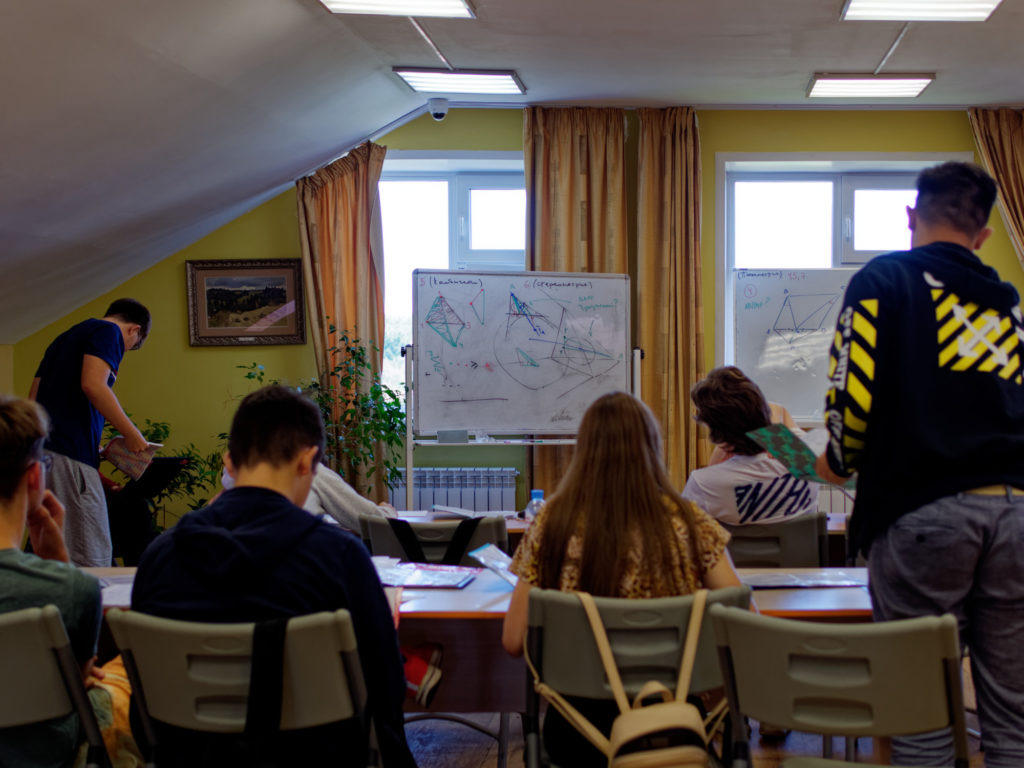
How it all started…
The first mathematical club that Lyudmila organized was inspired by summer schools in which she participated herself — Kirov’s mathematical summer school, and the summer camp Kvant, organized by members of Kazan University, which both influenced her strongly. When she was in fourth year at Kazan University, she offered to Alexey Rusakov, the first year student she knew from the Kvant camp, to teach school children together.
At the physics faculty of Kazan university, the security at those times didn’t check much, the school students would just get in and say that they come to study mathematics. They were let in — today it is hard to imagine with all the security reinforcement that happened in the last twenty years. Then, we searched with Alexey free rooms at the faculty. We only had six students — only the most interested would come. With a class on Tuesday, we spent all Monday with Alexey to prepare the problem sheets and think about the class. We took it with a lot of responsibility, and it gave its fruits: after one year, our children played in the final at the Ural tournament of so-called mathematical battles. They got the second place, but many people were surprised how our children progressed so well in only one year. For our first club, we were not paid at all, we were doing it from interest and for fun. Then we created the second math club when the children grew older. Then little by little we grew, there were more and more children coming, we changed places where we taught, found new places. Finally, in 2009, we have created an organization and obtained a licence to teach mathematics by ourselves to children and to be able to pay our teachers », Lyudmila tells us.
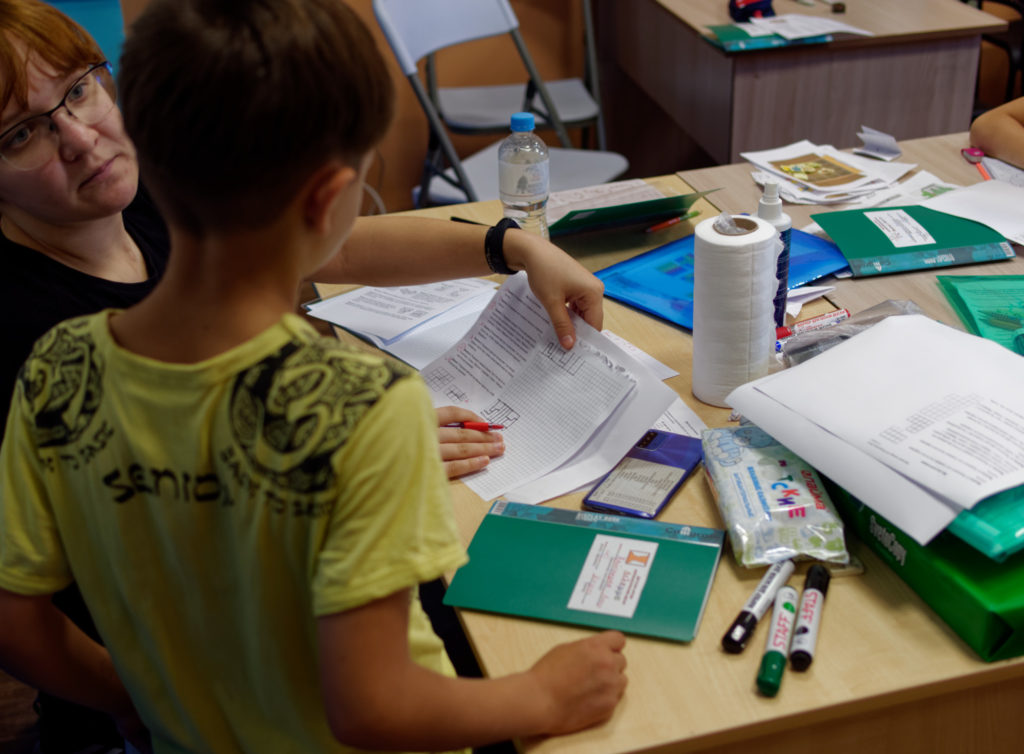
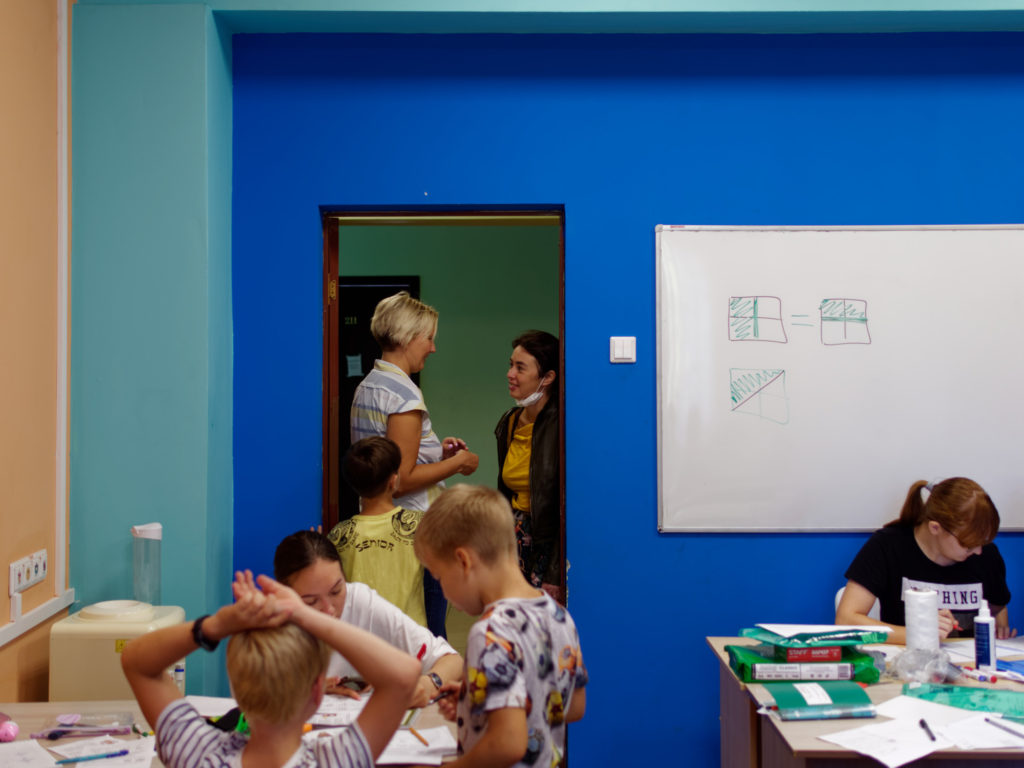
From teaching six students to teaching six hundred
We found Alexey Rusakov, Lyudmila’s friend and collaborator, teaching mathematics in one of the rooms of the Regina camp. Today he is one of the professors at the Mathematical Center. I have asked Alexey and Lyudmila several questions about their center.
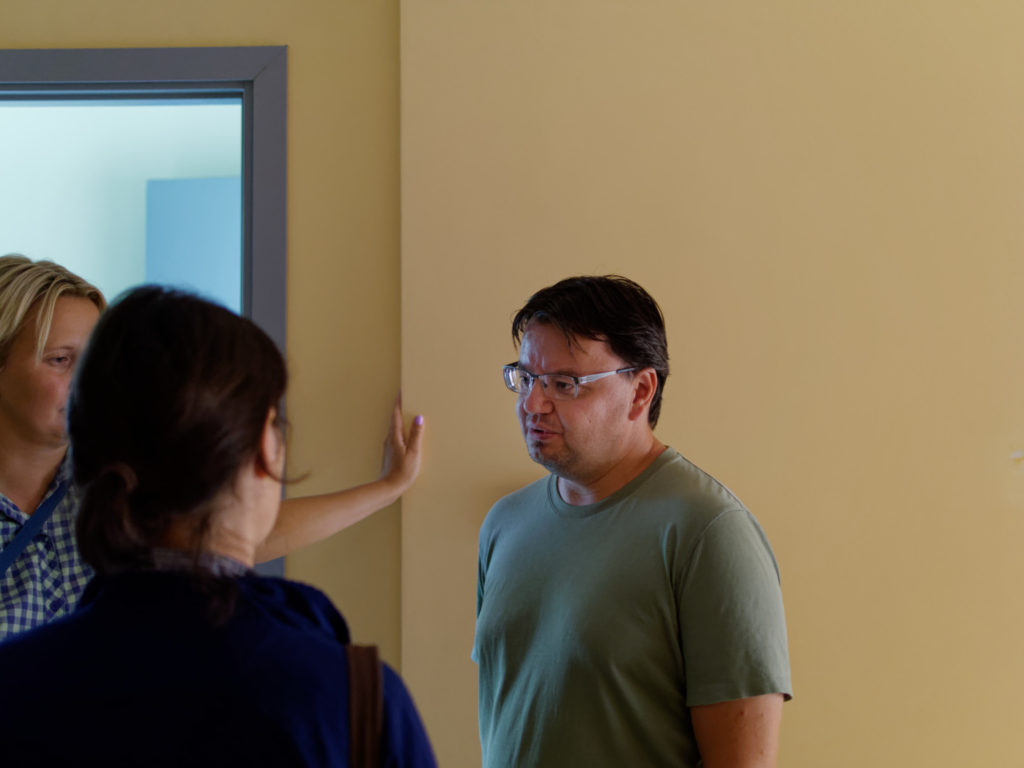
How do you explain the impressive growth of your Mathematical Center?
Alexey: First of all, we grow ourselves, organization-wise and pedagogically. When I think what I was doing as a teacher twenty years ago, I am asking myself: how one could give such sheets with problems to students? They do not teach them anything! They teach but… one wants to be more effective, one wants more and more.
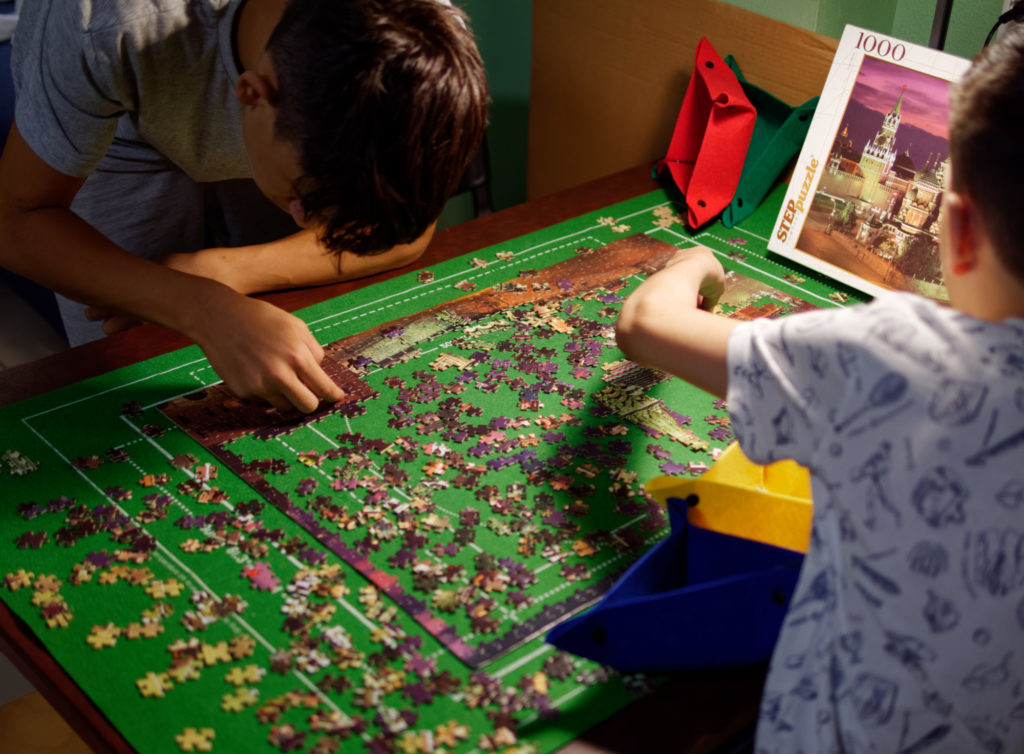
Our first goal is now to find talented children as early as we can — and now we know how to do it! In Tatarstan, we have a Republican Olympiad from the fourth grade (10 years old), and All-Russian olympiad happens for the seventh grade (13 years old). We also organize a city olympiad online that attracts, in the best years, ten thousand students. Then, once we have found talented children via olympiads, we have to understand how to teach them. And we have more and more experience with time. Moreover, children see that we like what we do, the atmosphere is created. Our collective is fun — people who get into it, want to come back. Many students come back here to teach themselves, it’s a virtuous circle of education!
Lyudmila: Kazan is a beautiful city, we have everything needed for life and entertainment, shops and restaurants, and you can reach everything by foot. One of our teachers has recently moved from Moscow to Kazan: he has an apartment in the center and walks 10 minutes till his work. After Moscow, he likes it a lot — walking near the Kremlin, not losing time for going from one place to another. Not everything is measured by money, there is also pleasure, community, atmosphere… Usually in our cabinet, everybody is doing something — printing some papers or stickers, discussing the championship that is coming next week, etc. Everybody has energy, since there are so many things to do and to share.
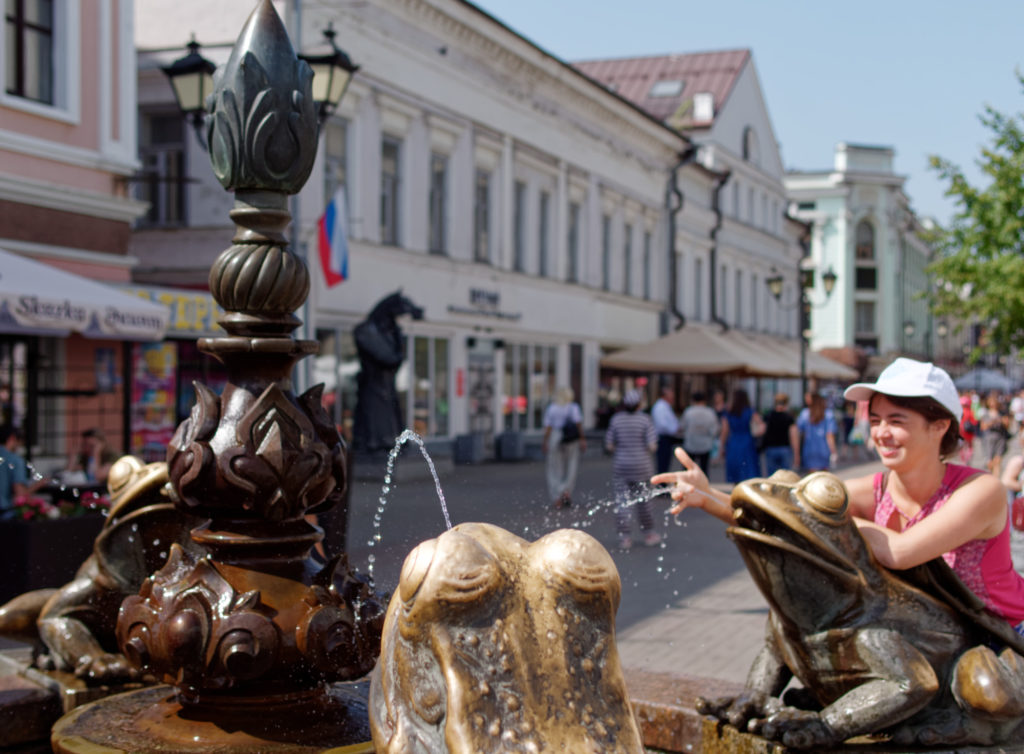
How does this olympiad activity influence research in mathematics?
Alexey: It is very easy to show how important olympiads are for revealing future exceptional researchers. In the last sixteen years of the Fields medal prize, the most prestigious research prize in mathematics, twelve people have competed at International Mathematical Olympiad (and that means that they were part of the olympiad system in their countries beforehand, that’s how it works). Stanislav Smirnov and George Perelman in Russia, for example. But there are also many other people, of whom one speaks less since they do not have a Fields medal but those who do wonderful mathematics. Maybe the olympiad movement is less influencing research today, especially in Russia, because researchers and good mathematicians are paid less than people working in private companies. Let me give you one example: Nikolai Durov [editor’s note: founder of vkontakte (a Russian equivalent to Facebook) and Telegram, one of the most used messengers today] can earn money somewhere else than in research… By the way, he has won at both International mathematics and informatics Olympiads, it’s quite unique.
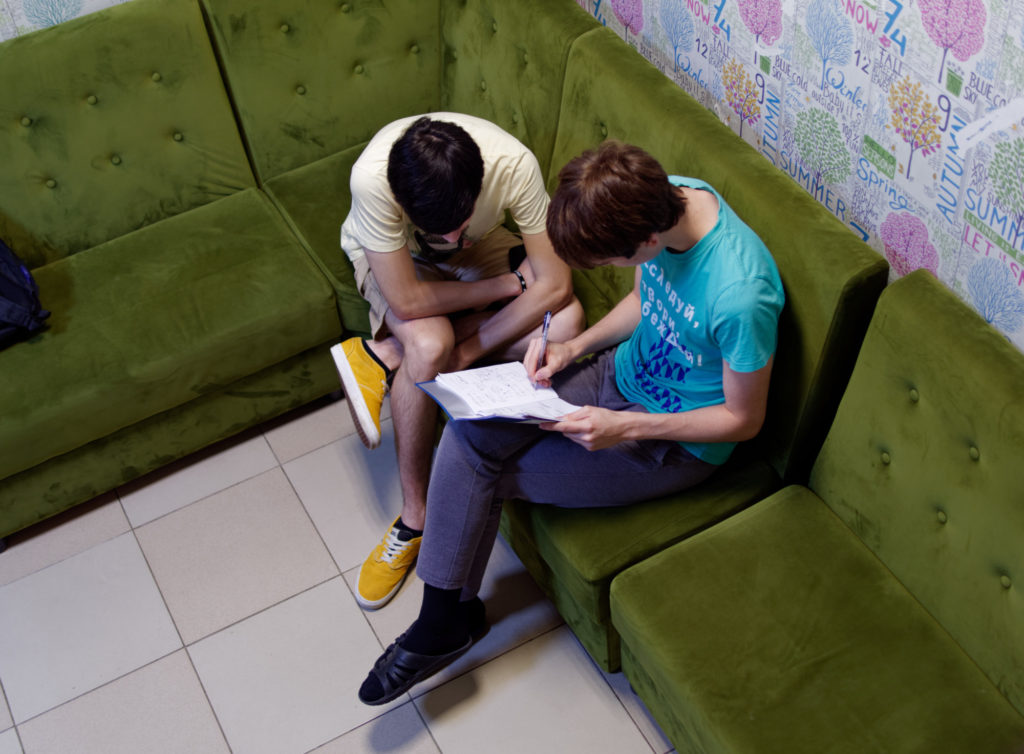
When you were creating your first math club together, did you think that you would do it forever or no ?
Lyudmila: For myself — yes, I knew it. I came back here to Kazan from Moscow because I wanted exactly that, I wanted to create cool math clubs in Kazan. I missed it when I was myself studying in school. I wanted to change the world.
Alexey: At the fourth year of university you already think about such things, but I did it only for fun in the beginning. I had some experience with teaching but not systematic. And then I wanted to continue and to learn something new. And little by little, it grew and never stopped…
Lyudmila: I am two years older than Alexey. He was at the first year when we started — you propose something to a first year student, he says yes, and then it becomes his life. (She laughs)
I understand how much olympiad mathematics is good for children
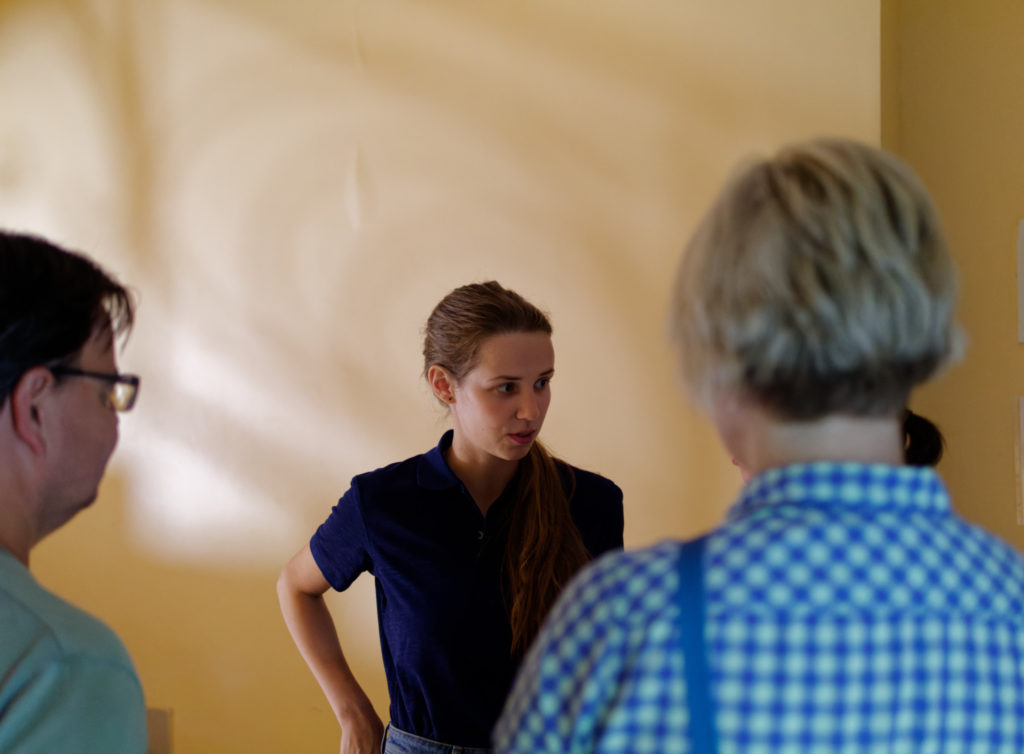
We meet Rimma in the corridors of the math camp. She is Lyudmila’s former student and one of the youngest teachers of the Mathematical Center, and could be easily mistaken for one of the students. « When I went to the math club, it was more than ten years ago (she laughs) and it was not as large-scale as it is today. As far as I understand, Alexey Sergeievitch and Lyudmila Yurievna were the only two guiding regular math clubs. Apart from them, nobody did it in Kazan — it was their initiative », Rimma says.
After school, Rimma entered a prestigious faculty in Moscow to study physics, finished the program and came directly back to Kazan. She is a rare student who came back after prestigious studies in Moscow or Saint Petersburg — most find jobs in the capitals, or leave abroad. When asked why did she come back from Moscow to Kazan, Rimma answers in a very serious tone that lights up her face.
There are several reasons. The main reason is the following: I understand how much olympiad mathematics — what we do here — are good for children. It develops their brain very well. If they do it, then everything in life will go well for them. They will be able to do anything that they want after it. Moreover, I like working with children.
At the end of my studies, I also understood that there are not enough people in Kazan to continue the movement — anybody who learns here can enter Moscow universities and study there, and then enter any company and work there.
Everything is thanks to our math club, but at the same time, nobody stays in Kazan — only those who taught us! All others leave. And there are now many more children… and not so many pedagogues. It’s quite a small circle of people who can teach mathematics at such level and in Kazan, there are not so many. If there is nobody who comes back, or comes in bonus, nothing would work at some point. There are, of course, many people who move to Moscow and push olympiad movement there. And it’s hard for Kazan to give a competition to Moscow salary-wise and now even harder since, you know, now Moscow pays money to children who win at olympiads there! So now not only students leave but also some school students… Everything is becoming more complicated now, of course. But Kazan is a wonderful city. And everybody can’t just go to Moscow, Russia is too big! »
Alexey and Lyudmila are staying nearby and smiling at Rimma’s words. One can literally feel how both of them are proud of her.
